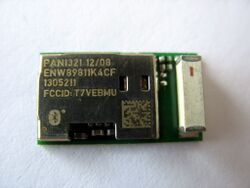Difference between revisions of "Protocol decoder:Pan1321"
Jump to navigation
Jump to search
Uwe Hermann (talk | contribs) m |
Uwe Hermann (talk | contribs) m |
||
| (4 intermediate revisions by the same user not shown) | |||
| Line 3: | Line 3: | ||
| name = Panasonic PAN1321 | | name = Panasonic PAN1321 | ||
| description = Bluetooth RF module with Serial Port Profile (SPP) | | description = Bluetooth RF module with Serial Port Profile (SPP) | ||
| status = | | status = supported | ||
| license = GPLv2+ | | license = GPLv2+ | ||
| source_code_dir = pan1321 | | source_code_dir = pan1321 | ||
| image = | | image = [[File:Panasonic pan1321 top.jpg|250px]] | ||
| input = [[Protocol Decoder:uart|uart]] | | input = [[Protocol Decoder:uart|uart]] | ||
| output = pan1321 | | output = pan1321 | ||
| Line 12: | Line 12: | ||
| optional_probes = — | | optional_probes = — | ||
| options = — | | options = — | ||
}} | }} | ||
The '''pan1321''' protocol decoder... | The '''pan1321''' protocol decoder supports the [https://www.panasonic.com/industrial/electronic-components/rf-modules/bluetooth-classic/pan1311-1321.aspx Panasonic PAN1321] Bluetooth module (serial port profile, SPP) protocol. | ||
== Hardware == | == Hardware == | ||
| Line 21: | Line 20: | ||
=== PAN1321 === | === PAN1321 === | ||
The [http://sigrok.org/gitweb/?p=sigrok-dumps.git;a=tree;f=uart/panasonic_pan1321 uart/panasonic_pan1321] directory in sigrok-dumps contains a set of example captures of the communication with a Panasonic PAN1321. | |||
The logic analyzer used was a [[ChronoVu LA8]] (at 500kHz): | |||
'''Probe setup:''' | '''Probe setup:''' | ||
{| border="0" style="font-size: smaller" class="alternategrey sortable sigroktable" | |||
|- | |||
!Probe | |||
!PAN1321 | |||
|- | |||
| 0 (green) | |||
| TX | |||
|- | |||
| 1 (orange) | |||
| RX | |||
|} | |||
'''Photos:''' | '''Photos:''' | ||
<gallery> | <gallery> | ||
File:Panasonic pan1321 top.jpg|<small>PAN1321, top</small> | |||
File:Panasonic pan1321 bottom.jpg|<small>PAN1321, bottom</small> | |||
File:Pan1321 open.jpg|<small>PCB</small> | |||
</gallery> | </gallery> | ||
== Protocol == | == Protocol == | ||
The device can be controlled via a UART connection (RX/TX and also RTS#/CTS# for flow control). | |||
The default baud rate is 115200, but the chip can be reconfigured to other baud rates, too. | |||
The protocol is mostly ASCII-based, using a [https://www.panasonic.com/industrial/includes/pdf/Panasonic_PAN13x1_AT_Command_Set.pdf specific AT command set], publically documented by the vendor. | |||
Commands and responses always end with \r\n. | |||
== Resources == | == Resources == | ||
* [https://www.panasonic.com/industrial/electronic-components/rf-modules/bluetooth-classic/pan1311-1321.aspx Panasonic: PAN1321] | |||
* [https://www.panasonic.com/industrial/includes/pdf/Panasonic_PAN1321_Datasheet.pdf PAN1321 datasheet] | |||
* [https://www.panasonic.com/industrial/includes/pdf/Panasonic_PAN13x1_AT_Command_Set.pdf PAN13x1 AT command set] | |||
[[Category:Protocol decoder]] | [[Category:Protocol decoder]] | ||
[[Category:UART]] | [[Category:UART]] | ||
Latest revision as of 22:05, 2 April 2015
 | |
| Name | Panasonic PAN1321 |
|---|---|
| Description | Bluetooth RF module with Serial Port Profile (SPP) |
| Status | supported |
| License | GPLv2+ |
| Source code | decoders/pan1321 |
| Input | uart |
| Output | pan1321 |
| Probes | — |
| Optional probes | — |
| Options | — |
The pan1321 protocol decoder supports the Panasonic PAN1321 Bluetooth module (serial port profile, SPP) protocol.
Hardware
PAN1321
The uart/panasonic_pan1321 directory in sigrok-dumps contains a set of example captures of the communication with a Panasonic PAN1321.
The logic analyzer used was a ChronoVu LA8 (at 500kHz):
Probe setup:
| Probe | PAN1321 |
|---|---|
| 0 (green) | TX |
| 1 (orange) | RX |
Photos:
Protocol
The device can be controlled via a UART connection (RX/TX and also RTS#/CTS# for flow control).
The default baud rate is 115200, but the chip can be reconfigured to other baud rates, too.
The protocol is mostly ASCII-based, using a specific AT command set, publically documented by the vendor.
Commands and responses always end with \r\n.


